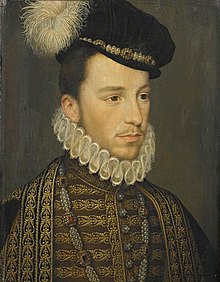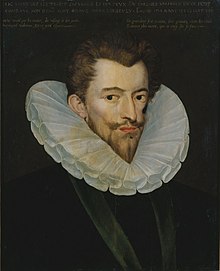Jean d'O
Upon Anjou's return as Henri III of France he became first an échanson (cup-bearer) in 1574 then gentilhomme de la chambre by 1577 before finally being elevated to the prestigious post of captain of the guard in 1580.
He was therefore present for the assassination of the king on 1 August, and after some negotiations, remained loyal to the royalist cause by swearing loyalty to his Protestant successor Henri IV on condition of his conversion and the maintenance of his office.
[2] Jean II's elder sister, Françoise d'O (1550–) married the royal favourite of Henri III the sieur de Maintenon.
[3] In the division of the family lands, Jean's elder brother François received the Norman and Perche seigneuries of O, Fresnes and Maillebois.
[4] From 1572 Manou would serve as a gentilhomme de la chambre (gentleman of the chamber) in the ducal household of the duc d'Anjou, brother to king Charles.
[9][10] After several months of inconclusive struggle the siege was brought to a conclusion by the news that Anjou had been elected as king of the Polish-Lithuanian Commonwealth, a peace was therefore arranged between the crown and the Protestants.
[11] When the duc d'Anjou was elected as king of the Polish-Lithuanian Commonwealth in 1573, both Manou and his elder brother D'O accompanied the prince to his new kingdom.
[13] Upon Anjou's return to France to assume the crown as Henri III, those of his household who were too young to hold any other position were made échansons (cup-bearers).
The collective of favourites (who would serve in a company of 350 lances under the overall authority of the sieur de Fervaques) included Caylus, Saint-Luc, Saint-Sulpice, Manou and D'O.}
[21] A few months into his new role as the captain of the guard, Saint-Luc was disgraced for obscure reasons, and the favourite fled from court to the security of his governate of Brouage.
Both Manou and his younger brother Fresnes were involved in supporting the prince in these endeavours, in response Henri got more severe about the subject.
[2] In 1588 Henri resolved of the necessity to be rid of the leader of the Catholic Ligue (League), and had the duc de Guise assassinated in December.
[27] He therefore aligned himself with the Protestant king of Navarre and made plans to recapture the ligueur (leaguer) held city of Paris.
[28][29] The combined royal Protestant army under the command of Henri III and the king of Navarre approached Paris with the intention of putting the ligueur held city under siege.
Clément asked to speak privately with the king, who responded by ordering the baron de Termes and another notable to leave their company.
They all became distraught throwing their hats to the ground, clenching their fists and praying that they would rather die a thousand deaths than serve Navarre.
[35] Henri was not insensitive to the scene which he saw, he understood none of these men wished to abide by the oaths they had taken to the prior king the night previously, not only did serving a Protestant violate their religion, but also their self interest.
It was intended to go first to the bishop of Paris Pierre de Gondi, and then be dispatched to Roma so that it would be clear to the Pope that Henri had died an irreproachable Catholic.



